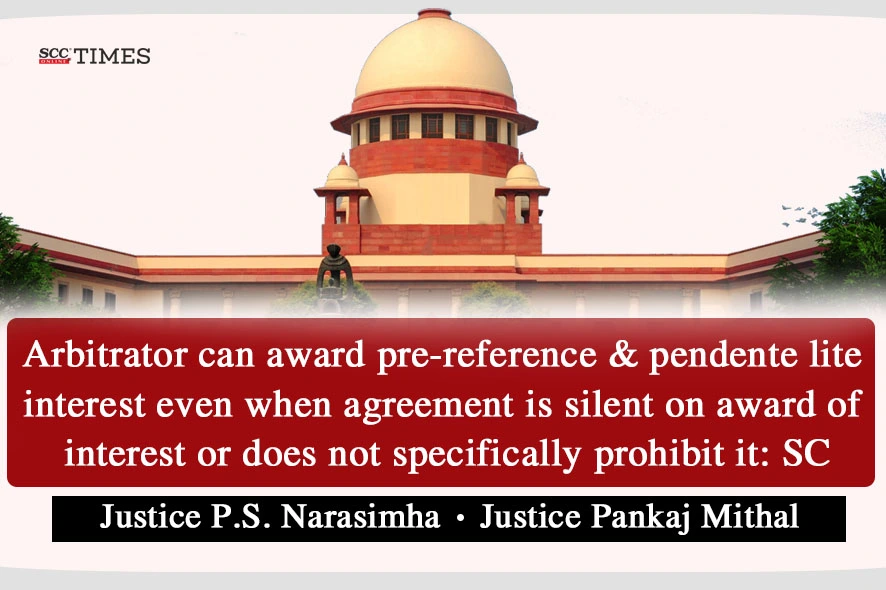Supreme Court: In civil appeals against Calcutta High Court’s decision, whereby the appellants appeal under Section 37 of the Arbitration and Conciliation Act, 1996 (‘the Act’) against Trial Court’s decision was partly allowed and claims regarding loss of business; uneconomic utilization of plant and machinery; labour charges for uneconomical stoppage of work; interest on delayed payment of running account bills and escalation bill; escalation; interest on the sum awarded; and costs, were partly sustained by upholding Arbitrator’s Awards in some claims and setting aside in others, the Division Bench of PS Narasimha* and Pankaj Mithal, JJ. upheld the High Court’s decision in setting aside the Award with respect to claim no. 3 as to loss caused due to idle labour, machinery, etc. The Bench set aside the judgment of the High Court in so far as it rejected and set aside claim no. 4 for interest on delayed payment of running account bills.
Factual Matrix
The State of West Bengal/ respondent issued a notice inviting tenders on 08-09-2010, for the widening and strengthening of Egra Bajkul road under the Tamluk Highway Division and accepted appellant’s offer, leading to grant of a Work Order for the project to be completed within 18 months from 23-12-2010. The project got delayed by about five months, but the work was completed by 09-11-2012. The appellant/ developer raised a bill for Rs. 77,85,290 owing to alleged delays on respondent’s part and that was in addition to seven other claims under different heads relating to loss of business; uneconomic utilization of plant and machinery; labour charges for uneconomical stoppage of work; interest on delayed payment of running account bills and escalation bill; escalation; interest on the sum awarded; and costs. The dispute was referred to Arbitration for resolution. The Arbitrator gave his award, holding the respondents are liable to the tune of Rs.1,37,25,252, with interest.
The Award was challenged under Section 34 of the Act by the respondents and the Trial Court allowed the same in part, setting aside claim no. 1 for loss of business, since the same had never been claimed by the appellant and was thus beyond the Arbitrator’s jurisdiction. Claim no. 2 for uneconomic utilization of plant and machinery was also set aside because the Arbitrator did not account for the loss of 135 days at the behest of the appellant while determining the alleged 200 days of ‘wasted machine’.
The appellant filed an appeal under Section 37 of the Act against the order setting aside the award on claims 1 and 2. On the other hand, the respondent filed a cross appeal to set aside of the rest of the claims as well. The High Court in the impugned order exercising jurisdiction under Section 37 of the Act, set aside claim no.1 as well as claim nos. 3 and 4, but restored the Award with respect to claim no.2. However, while retaining claim no. 5 as it is, the High Court slightly modified claim no. 6 relating to pre-reference interest.
Analysis of Claims and Decision
Claim No. 3: Loss caused due to idle labour, machinery, etc.
The Court noted that the Arbitrator had awarded claim no. 3 in favour of the appellant for Rs.5,80,500. The challenge to the Award was dismissed by Trial Court, whereas the High Court examined the relevant clauses of the contract and held the claim was impermissible under the contractual provisions. The Court agreeing with High Court’s view said that it did what the Arbitrator should have done, i.e., examination of the contract. It is the duty of every Arbitral Tribunal and Court alike and without exception, for contract is the foundation of the legal relationship. The Arbitrator did not even refer to the contractual provisions and the Trial Court dismissed the objections under Section 34 with a standard phrase that “findings of the Arbitrator cannot be held to be irrational, insensible or unrealistic and also that they are not in conflict with public policy”. Hence, the Court upheld the High Court’s reasoning for being correct.
Claim No. 4: Interest on delayed payment of running account bills.
The Court noted that the District Court upheld the Arbitrator’s finding that payments on running account bills was guided by Clause 7 of the contract and there was no prohibition in the contract regarding payment of interest on the ‘blocked capital’. Therefore, holding that the injured party ought to be placed in the same financial position he would have been but for the other party’s fault, the Arbitrator awarded interest on delayed payments at the rate of 12% p.a., which was quantified to Rs. 54,84,024. The Court set aside the High Court’s judgment and reasoning setting aside the Arbitrator’s Award for claim No. 4. The Court opined that the High Court’s conclusion that “it appears that the bills were paid soon after they were prepared” or that, “in that case there could not have been any claim for interest”, cannot qualify as grounds for interference under Section 37 and similarly, the approach of the High Court in holding that the Arbitrator neither established nor discussed the questions posed by it is not a ground to set aside the Award. The Court held that it did not see anything perverse in Arbitrator’s Award and reasoning behind it. Hence, the Court set aside the judgment of the High Court in relation to claim no. 4 and restored the Award and thereby the judgment of the Trial Court upholding the Award.
Claim No. 6: Interest
The Court noted that the Arbitrator’s Award of interest @12% on sum awarded from 12-04-2016, which is the date when appellant claimed breach of contract, to 30-01-2018, which is the date of the Award, and further interest @ 9.25% p.a. from date of Award till actual payment was confirmed by the Trial Court. Further, the Court noted that the High Court held that the contract between the parties prohibited grant of pre-reference interest and therefore interest could not have been granted for this period and that the Arbitrator could have granted interest only for pendent lite and post award.
The Court held that the High Court had no reason to interfere with the Arbitral Award with respect to grant of pre-reference interest, since the contract between parties did not prohibit the same. The Court said that the power of the Arbitrator to grant pre-reference interest, pendente lite interest, and post-award interest under Section 31(7) of the Act is fairly well-settled. The Court reiterated the propositions, as follows:
-
Under the Arbitration Act, 1940, there was no specific provision that empowered an Arbitrator to grant interest. However, through judicial pronouncements, this Court affirmed the power of the Arbitrator to grant pre-reference, pendente lite, and post-award interest on the rationale that a person who has been deprived of the use of money to which he is legitimately entitled has a right to be compensated for the same. When the agreement does not prohibit the grant of interest and a party claims interest, it is presumed that interest is an implied term of the agreement, and therefore, the Arbitrator has the power to decide the same.
-
Under the 1940 Act, this Court adopted a strict construction of contractual clauses that prohibit the grant of interest and held that the Arbitrator has the power to award interest unless there is an express, specific provision that excludes the jurisdiction of the Arbitrator4 from awarding interest for the dispute in question.
-
Under the Act, the power of the Arbitrator to grant interest is governed by the statutory provision in Section 31(7), which is divided in two parts. Under sub-section (a), the Arbitrator can award interest for the period between the date of cause of action to the date of the award, unless otherwise agreed by the parties. Sub-section (b) provides that unless the award directs otherwise, the sum directed to be paid by an arbitral award shall carry interest at the rate of 2% higher than the current rate of interest, from the date of the award to the date of payment.
-
The wording of Section 31(7)(a) marks a departure from Arbitration Act, 1940 in two ways: first, it does not make an explicit distinction between pre-reference and pendente lite interest as both of them are provided for under this sub-section; second, it sanctifies party autonomy and restricts the power to grant pre-reference and pendente lite interest the moment the agreement bars payment of interest, even if it is not a specific bar against the Arbitrator.
-
The power of the Arbitrator to award pre-reference and pendente lite interest is not restricted when the agreement is silent on whether interest can be awarded or does not contain a specific term that prohibits the same.
-
While pendente lite interest is a matter of procedural law, pre-reference interest is governed by substantive law. Therefore, the grant of pre-reference interest cannot be sourced solely in Section 31(7)(a) (which is a procedural law), but must be based on an agreement between the parties (express or implied), statutory provision (such as Section 3 of the Interest Act, 1978), or proof of mercantile usage.
CASE DETAILS
|
Citation: Appellants : Respondents : |
Advocates who appeared in this case For Petitioner(s): For Respondent(s): |
CORAM :










